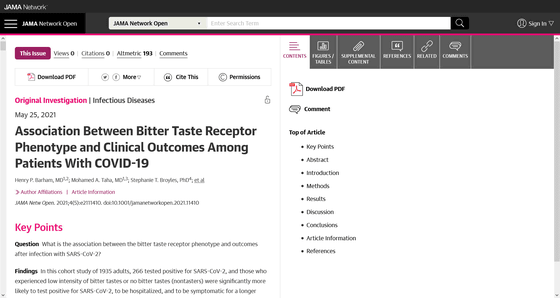'Super taster' who is sensitive to taste at the genetic level may be less likely to be infected with the new corona

People who are genetically sensitive to bitterness are called 'super tasters.' A research team of doctors in Louisiana, USA, found that supertasters are less likely to be infected with COVID-19, based on data from approximately 2000 patients who underwent PCR testing for coronavirus disease (COVID-19). I'm pointing out.
Association Between Bitter Taste Receptor Phenotype and Clinical Outcomes Among Patients With COVID-19 | Infectious Diseases | JAMA Network Open | JAMA Network

Weird Discovery Shows'Supertasters' Could Be Better at Fighting Off SARS-CoV-2
https://www.sciencealert.com/weird-discovery-shows-supertasters-could-be-better-at-fighting-off-sars-cov-2
'Super taster' is a property related to the bitter taste receptor gene TAS2R38 , and can sense the bitter taste components phenylthiocarbamide and propylthiouracil more sensitively. Super tasters have a keen sense of taste, not just bitterness, so some ingredients cannot be accepted and they may suffer from selective eating disorders.
A research team led by Dr. Henry Burnham of Louisiana was investigating the characteristic symptom of COVID-19, 'loss of taste and smell,' and found that a person who was diagnosed positive by the COVID-19 infection test. I noticed that there was no super taster inside.
Therefore, the research team used lithomas test strips treated with phenylthiocarbamide, thiourea, and sodium benzoate for 1935 people who underwent PCR tests between July 1st and September 30th, 2020. I did a test. As a result, of the 1935 people, 508 (26.3%) were 'super tasters' with a keen taste, 917 (47.4%) were 'tasteers' with a general taste, and 510 (26.4%) were dull. It was classified as a 'non-taste'.
When the research team analyzed the results of PCR tests on the subjects, 266 out of 1935 were diagnosed as positive, of which 104 were tasters, 147 were non-tasters, and only 15 were super-tasters. .. The research team found that supertasters were infected with COVID-19, as only 5.6% of patients diagnosed as positive had supertasters, which accounted for approximately one-quarter of all patients tested for PCR. It points out that it may be difficult to do.
In addition, 55 out of 266 positive patients were forced to be hospitalized, 47 of whom were found to be non-tasters. From this, the research team argues that the difference in taste caused by TAS2R38 is associated with the risk of COVID-19 becoming more severe. In addition, 55 patients who were hospitalized did not complain that they 'did not feel the taste', and half reported that they 'did not feel the smell'.

The research team speculates that activation of the bitter taste receptor gene may be related to the immune response, but the new coronavirus itself is still not clearly understood in many parts, so the bitter taste receptor gene The specific mechanism by which is affected by the immune response is unclear.
'The bitter taste receptor seems to play an important role in innate immunity. This finding is significant in understanding the new coronavirus, as well as the annual infection by other viruses, including influenza. It can make sense. '
Related Posts:
in Science, Posted by log1i_yk







